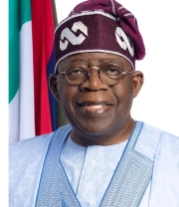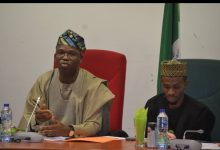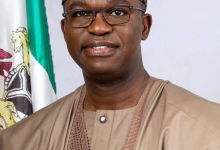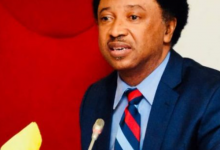
CSO’s Strategist celebrates Tinubu’s democratic legacy
CITIZENS COMPASS—As Nigeria marks another year of democratic governance, CSO’s Strategist on Friday, lauded the efforts of President Bola Ahmed Tinubu and his democratic legacy.
Balogun Hameed, Convener, Frontline Socio-Economic Research Centre (FSRC), gave the remarks in a statement on behalf of the CSOs.
The statement was jointly signed by Co-Conveners;
Workbond International Network (WIN), Yoruba Youth Assembly (YYA), Congress of Nigerian Youth League (CNYL) and Centre for Human and Socio-economic Rights. (CHSR)
Others were Lagos State Liberation Congress (LASLIC), People’s Accountability and Transparency (PAT), Vanguard for Social Justice (VSJ), Centre for Human Rights (CHR) and Centre for Peace Initiatives (CPI).
It reads; CSO’s Strategist believes it is imperative to remember and honour the heroes who risked all for the restoration of civil rule. Chief among them is Asiwaju Bola Ahmed Tinubu, a prominent figure in Nigeria’s pro-democracy movement, whose unwavering commitment to justice, freedom, and democracy during the dark days of military dictatorship left an indelible mark on the nation’s history.
From Technocrat to Democrat: The Emergence of a Political Maverick
PBAT began his professional career in the corporate sector, working with leading firms such as Deloitte and Mobil. However, his transition from boardrooms to barricades was driven by a deep-seated belief in democratic ideals. Elected as a Senator representing Lagos West in the short-lived Third Republic (1992–1993), Tinubu quickly emerged as a vocal opponent of military authoritarianism, particularly under the regime of General Ibrahim Babangida.
The June 12 Struggle: Standing for the Mandate of the People
The annulment of the June 12, 1993 presidential election, widely regarded as the freest and fairest in Nigeria’s history and believed to have been won by Chief Moshood Kashimawo Olawale (M.K.O.) Abiola, was a turning point. President Tinubu, like millions of Nigerians, was outraged by the blatant subversion of the people’s will.
Rather than retreat into silence, Tinubu became a leading voice in demanding the de-annulment of the election and the immediate recognition of M.K.O. Abiola’s victory. His firm opposition to the military junta placed him directly in the cross hairs of the regime, but it also propelled him into the forefront of the resistance.
NADECO: A pillar in the pro-democracy movement
PBAT was a founding member and a prominent leader of the National Democratic Coalition (NADECO)—the most formidable opposition platform formed to challenge the military rule. Established in 1994, NADECO brought together like-minded politicians, activists, and professionals to demand an end to military dictatorship and a return to civilian governance.
As a key financier, strategist, and spokesperson for NADECO, Tinubu played critical roles in:
Organizing civil disobedience and international advocacy, financing underground media operations and exile broadcasts, mobilizing diplomatic pressure through international lobbies and coordinating safe havens for persecuted activists and journalists.
His house in Lagos became a rallying point and a strategic center for many NADECO activities until it was eventually targeted by security operatives.
Exile and underground resistance
Following the increased crackdown on pro-democracy leaders by the General Sani Abacha regime, Asiwaju was forced into exile in 1994. Operating from the United States and the United Kingdom, he continued to campaign vigorously for democracy in Nigeria. While abroad, he collaborated with other NADECO leaders in exile, including Professor Wole Soyinka and Admiral Ndubuisi Kanu, using international platforms to expose human rights abuses in Nigeria and to galvanize global support for the restoration of democratic governance.
Return and rebuilding democracy
With the death of General Abacha in 1998 and the transition to democracy, a pro democrat, Tinubu, returned to Nigeria and immersed himself in the process of rebuilding the nation. He contested and won the governorship of Lagos State in 1999 under the banner of the Alliance for Democracy (AD), marking the beginning of a new chapter in his political journey.
As a democratically elected governor from 1999 to 2007, he championed reforms in education, infrastructure, taxation, and governance. He also laid the foundation for the emergence of a progressive political opposition, which later culminated in the formation of the All Progressives Congress (APC), the party that broke the long-standing dominance of the PDP at the federal level in 2015.
Legacy and recognition
Tinubu’s democratic activism, personal sacrifices, and strategic leadership during the military era earned him the title of “Asiwaju” (leader) of Lagos and the “Jagaban” of Borgu, symbolizing his national stature and influence.
His role in NADECO and the June 12 struggle continues to be celebrated as a cornerstone of Nigeria’s Fourth Republic. Today, as Nigeria continues to grapple with the challenges of democratic consolidation, Bola Ahmed Tinubu’s contributions remain a guiding reference point in the ongoing pursuit of a just, equitable, and democratic society.
Conclusion
President Asiwaju Bola Ahmed Tinubu’s involvement in the June 12 movement, his leadership in NADECO, and his exile-driven activism against military dictatorship stand as profound testaments to his belief in the Nigerian people and their right to self-determination. His courage during one of Nigeria’s darkest political chapters helped pave the way for the democratic freedoms Nigerians enjoy today.
For CSO’s Strategist;
Balogun Hameed
Convener
Frontline Socio-economy Research Centre (FSRC)
Co- Conveners
Workbond International Network (WIN)
Yoruba Youth Assembly (YYA)
Congress of Nigerian Youth League (CNYL)
Centre for Human and Socio-Economic Rights. (CHSR)
Lagos State Liberation Congress (LASLIC)
People’s Accountability and Transparency (PAT)
Vanguard for Social Justice (VSJ)
Centre for Human Rights (CHR)
Centre for Peace Initiatives (CPI







